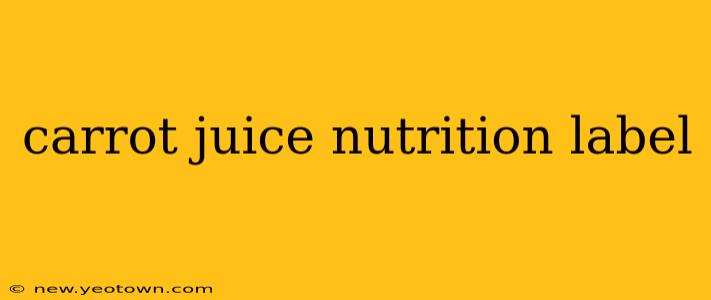Carrots, those humble orange vegetables, hold a surprising nutritional punch. And when you concentrate their goodness into a vibrant glass of carrot juice, you’re unlocking a potent source of vitamins, minerals, and antioxidants. But what exactly is in that bottle or carton? Let's unravel the mysteries of the carrot juice nutrition label and explore its health benefits.
Imagine this: a crisp autumn day, the sun painting the leaves in fiery hues, and you're enjoying a refreshing glass of homemade carrot juice. That's the scene that often springs to mind when we talk about this healthy beverage. But the reality of the label can be more complex than that idyllic image. Let's break it down section by section.
What are the Key Nutrients in Carrot Juice?
The nutritional composition of carrot juice can vary slightly depending on the carrots used (organic, conventionally grown, variety), and any added ingredients (like ginger, lemon, or apple). However, some key components consistently stand out. A typical serving (around 8 ounces) is generally rich in:
- Vitamin A (Beta-Carotene): This is the star of the show. Carrots are famously high in beta-carotene, a precursor to vitamin A, crucial for vision health, immune function, and cell growth. Your body converts beta-carotene into vitamin A as needed.
- Vitamin K: Important for blood clotting and bone health.
- Potassium: An electrolyte vital for maintaining fluid balance, nerve signals, and muscle contractions.
- Antioxidants: Carrots boast an impressive array of antioxidants, including carotenoids, which help protect your cells from damage caused by free radicals.
How Many Calories Are in a Serving of Carrot Juice?
The caloric content usually falls within a reasonable range, typically around 60-90 calories per 8-ounce serving. However, this can increase if sugar or other ingredients are added. Always check the label! Consider this: a glass of carrot juice can be a satisfying and relatively low-calorie way to get a boost of essential nutrients.
Does Carrot Juice Contain Sugar? Is it Healthy?
Yes, carrot juice does contain natural sugars. However, it's important to distinguish between added sugars and naturally occurring sugars. The sugars in carrot juice are fructose and glucose, found naturally within the carrot itself. While moderate consumption is generally fine, excessive intake of any juice, including carrot juice, can contribute to high blood sugar levels. Moderation is key.
Is Carrot Juice Good for Weight Loss?
While carrot juice offers several health benefits, it's not a magic weight-loss potion. It's relatively low in calories compared to many other juices, but its liquid form doesn't offer the satiety of eating whole carrots. Replacing a meal with carrot juice alone might leave you feeling hungry later. A balanced diet and exercise remain the cornerstones of successful weight management.
What are the Potential Side Effects of Drinking Carrot Juice?
While generally safe, consuming large quantities of carrot juice can lead to a condition called carotenemia, causing your skin to turn a yellowish-orange tint. This is usually harmless and temporary, resolving once you reduce your intake. Also, individuals with certain allergies or digestive sensitivities should be mindful of potential reactions.
Can Carrot Juice Help Improve My Eyesight?
The high vitamin A content in carrot juice is well-known for its role in maintaining eye health. Vitamin A supports the function of the retina, which is crucial for good vision. However, while carrot juice can be part of a healthy diet that promotes eye health, it's not a cure for vision problems. Consult an eye doctor for any concerns about your vision.
In conclusion, the carrot juice nutrition label provides a window into a nutritional powerhouse. While enjoying a glass of this orange elixir offers numerous benefits, mindful consumption and a balanced approach to diet and lifestyle are always recommended. Remember to always check the label for added ingredients and sugar content, and enjoy it as part of a holistic healthy lifestyle.

